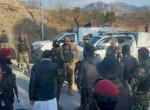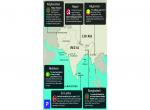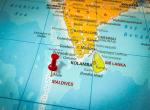A police escort was killed and another wounded when militants attacked a team of polio vaccinators on the outskirts of Peshawar on 30 November.1 Earlier on 23 November, militants in Pakistan kidnapped eleven teachers involved in a polio vaccination campaign for school children at a private school in the Bara area of the Khyber tribal agency. The militants took the teachers to an area controlled by Taliban-affiliated Lashkar-e-Islam group.2 These incidents are amongst a string of senseless attacks carried out over the last few years by the Pakistani Taliban (or the Tehrik-i-Taliban Pakistan-TTP) on health workers working under Pakistan’s polio immunisation programme. This article looks at the impact of these actions of the TTP on Pakistan’s efforts to rid itself of polio, particularly after medical evidence has indicated that Pakistan may have contributed to the spread of the disease to Syria, and implications this holds for India.
A strain of the virus that originated in Pakistan has caused polio and crippled at least 13 children in Deir al-Zor, Syria, where an outbreak was detected in October. Genetic sequencing has confirmed the origin of the virus strain found in Syrian children. According to the Assistant Director-General for Polio, Emergencies and Country Collaboration at the World Health Organisation (WHO), the virus has travelled over land to Syria3 and is spreading across the Middle East. Emergency plans are being implemented to vaccinate more than 20 million children in the region.4 Closely related strains of the wild polio virus of Pakistani origin have also been detected in sewage samples in Israel, the West Bank and Gaza Strip since February 2013. The vaccinations are to be carried out in Egypt, Iraq, Jordan, Lebanon, the Gaza Strip, West Bank, Syria, and Turkey. 5
Pakistan
Pakistan is one of three nations in the world (others being Afghanistan and Nigeria) where polio remains endemic. Efforts to stamp out polio in Pakistan through an oral immunisation programme have been on since 1994. The programme had begun to yield results; in 2011 there were 198 new recorded cases of polio in Pakistan, while in 2012, there were just 58. However, the official number of polio cases detected so far this year, have risen to 72. Most of the polio cases have been detected in Pakistan's tribal regions; 19 cases from North Waziristan, 17 from Khyber, 9 from Khyber Pakhtunkhwa province, 6 each from Bannu and Punjab, and 4 from Sindh have been reported so far this year.6
The Pakistani polio programme was initially targeted by the clergy and the Taliban who declared the vaccination as a Western ploy to render Muslims sterile by alluding to the fact that it was receiving foreign financial assistance. However, there was little improvement in the situation even after the funding of the programme was taken over by the Pakistani government with the assistance of the Bill and Melinda Gates Foundation (B&MGF), which had pledged to pay the seven per cent annual interest on the $227 million loan the Islamic Development Bank had provided to Pakistan for polio immunisation.
Another misconception is that the polio vaccine contains materials forbidden by Islam, such as alcohol and pig’s blood.7 The misconceptions are worse among the Pashtun population. Officials associated with the programme, however, blame it on the country’s failure to ensure quality polio vaccination, preventing immunisation refusal and the inability to reach all children under five years of age.8
Since July last year, 24 health workers and policemen providing protection to these health workers have been killed and 14 others injured in 24 targeted attacks on vaccinators in different parts of the country by the Taliban.9 The most recent attack having taken place on the outskirts of Peshawar when two people were killed and 13 wounded in a bombing that targeted polio workers.10 Attacks on health workers have not been restricted to the north of the country; in December 2012, gunmen killed four women working on a government polio vaccination campaign in Karachi.
Other Factors
Besides vaccination refusal, denial of access to certain restive areas is a major cause for the rise in polio cases. According to reports, the authorities in FATA were unable to vaccinate around 900,000 targeted children either due to the TTP’s ban on vaccination in North and South Waziristan agencies last year or due to military action against militants in other agencies.
Many Pakistanis have viewed polio vaccination campaigns with suspicion after the CIA's use of a fake vaccination program in 2011 to collect DNA samples from residents of Osama bin Laden's compound to verify his location. The policy gave credence to the conspiracy theories in circulation. Last year, a Taliban commander in northwest Pakistan announced a ban on polio vaccines for children in the region as long as the US continues its campaign of drone strikes in the region. The TTP also believes that western powers are using polio vaccination programmes as a cover for espionage. 11
However, many experts believe TTP’s strategy goes deeper. “It’s another way of trying to control the population through fear”. The difference in perception between the Afghan Taliban and the TTP on such issues gives credence to this notion. Mullah Omar had issued a statement that called for a change in the Taliban attitude, particularly towards women’s rights and education. In May 2013, the Afghan Taliban endorsed polio vaccination saying, “According to the latest international medicine science, the polio disease can only be cured by preventive measures i.e. the anti-polio drops and the vaccination of children against this disease. The Islamic Emirate of Afghanistan supports and lends a hand to all those programs which works for the health care of the helpless people of our country.”12 Mullah Omar has allowed polio immunisation in Taliban dominated areas of Afghanistan since 2007.13
The Afghan Taliban proceeded to warn organisations not to attack polio immunisation teams. The Taliban ‘advisory’ was applicable to all its affiliates including the TTP. However the TTP continued with its targeting of Pakistani health workers carrying out polio-immunisation; drawing international condemnation. These acts, amongst others including kidnapping and extortion, were reported to have deeply strained the relations between the TTP and Mullah Omar.
Gender Aspect
It has been suggested that there is a gendered aspect to TTP’s actions based on the recent history of militant violence being directed against “lady health workers”, a body of more than 100,000 women who deliver door-to-door healthcare.14 The lady health worker programme was initiated by Benazir Bhutto in 1994, and for many women and girls in remote areas, they provide the only direct access to healthcare. A 2012 study published in the British Medical Journal looked at how the Taliban threatened and attacked female health workers in Swat during their brief period of control of the area. Lady health workers were socially ostracised after public vilification by the TTP. The study also found that many Lady health workers stopped working or left the area due to the threat to their lives.
Afghanistan
According to the Global Polio Eradication Initiative, Afghanistan is one of three countries in the world where polio remains endemic. There have been 8 confirmed cases of polio in 2013 (as of October) and 37 reported cases in 2012, which were confined to the southern provinces, specifically within thirteen districts in the provinces of Helmand, Kandahar, and Uruzgan. However, the eight cases of polio confirmed in 2013 are located in the eastern provinces of Nangarhar and Kunar. Same has been confirmed by WHO, which said that polio has been eradicated across the country except Kunar and Nangarhar provinces (which are adjoining FATA).15
India
WHO removed India from the list of polio-endemic countries in March 2012 after India successfully completed an entire year without an incidence of polio. However, India will have to remain polio free for two more years before it is declared polio-free by the WHO.16 India is alive to the possibility of the polio virus entering the country through transnational movement of people, particularly from Pakistan and Afghanistan. The Central government has alerted all the States bordering the neighbouring countries to strengthen surveillance. Special booths have been established on the Wagah border and Attari and Munabao train stations to ensure that all children under the age of 5 coming from across the border are given polio drops.
In 2012, after WHO removed India from the list of polio-endemic countries, Dr. Zulfiqar A. Bhutta, a vaccine expert at Aga Khan University’s medical school in Karachi, stated “[n]othing wounded our pride as much as that”. Following the WHO announcement, Pakistan’s government went on an emergency footing. A cabinet-level “polio cell” 17 was created and various mullahs were drafted to endorse the vaccination campaign in order to dispel persistent rumours and to give moral legitimacy to the program. The mullahs subsequently issued 24 fatwas in favour of vaccination and the same was disseminated to the public through the health care workers.
Impact
Given the current situation where Syrians refugees in neighboring countries have topped two million and that the immunization level in these areas is not reassuring, the risk of further spread of the wild poliovirus across the region is considered to be high. A surveillance alert has been issued to actively search for additional potential cases. Lebanon, which hosts more than 800,000 Syrian refugees, is vaccinating all children under five. In Europe, experts have warned that the Syrian refugees could inadvertently bring polio virus to Europe.18 The issue has further complicated the humanitarian crisis arising out of the Syrian conflict.
Back in Pakistan, the government has included polio vaccination programme on the agenda for the proposed dialogue with the Taliban groups. Imran Khan’s new provincial government in KPK is planning to give polio workers weapons licenses to carry their own guns.19 However, the issue remains complex not only because of the TTP and insurgency in FATA but because of the fact that the polio virus is also endemic to Afghanistan and that Pakistan hosts large number Afghan refugees. This worsening situation in Pakistan has the capability to negate the positive gains seen in Afghanistan as cross-border movements in the region could see a resurge of polio in the region.
India on the other hand, besides escalation of terrorism post-2014, would also be mindful of the polio virus as a destabilized region could see refugee movements into the country at a time it would be celebrating the success of its decades-long ‘Pulse-polio’ programme.
(The author is an independent analyst based in New Delhi)
Endnotes
- Polio cop, 3 soldiers killed in attacks, The Nation, December 01, 2013. http://www.nation.com.pk/pakistan-news-newspaper-daily-english-online/national/01-Dec-2013/polio-cop-3-soldiers-killed-in-attacks
- Jibran Ahmad. Pakistan militants kidnap 11 teachers in polio vaccination campaign, Reuters, November 23, 2013. http://news.yahoo.com/pakistan-militants-kidnap-11-teachers-polio-vaccination-campaign-075245077.html
- Syed Fazl-e-Haider. The virus of extremism fuels the spread of polio in Pakistan, The National, November 2, 2013. http://www.thenational.ae/thenationalconversation/comment/the-virus-of-extremism-fuels-the-spread-of-polio-in-pakistan
- Stephanie Nebehay Polio strain in Syria originated in Pakistan, WHO confirms, Reuters, Nov. 11, 2013. http://www.nbcnews.com/health/polio-strain-syria-originated-pakistan-who-confirms-2D11577484
- WHO: Pakistan Polio Strain In Syria, RFE/RL, November 12, 2013.
http://www.rferl.org/content/pakistan-polio-syria/25165286.html - Ashfaq Yusufzai. Polio incidence higher than last year, Dawn, November 13, 2013.
http://dawn.com/news/1056082/polio-incidence-higher-than-last-year - Samira Shackle. The struggle for a Polio-free Pakistan, NewStatesman, June 252013. http://www.newstatesman.com/politics/2013/06/struggle-polio-free-pakistan
- Ser 6.
- Ser 3.
- 2 killed in blast targeting Pakistani polio workers, CNN, October 8, 2013. http://edition.cnn.com/2013/10/07/world/asia/pakistan-polio-workers-attack/
- Ser 3.
- Zubair Babakarkhail and Dean Nelson. Taliban renounces war on anti-polio workers, The Telegraph, May 13 2013. http://www.telegraph.co.uk/news/worldnews/asia/afghanistan/10053981/Taliban-renounces-war-on-anti-polio-workers.html
- Yaroslav Trofimov. ‘Risky Ally in War on Polio: the Taliban,’ WSJ, January 15, 2010. http://online.wsj.com/news/articles/SB126298998237022117
- Ser 7.
- BBC Pashto, November 19, 2013.
- Aarti Dhar. India no more a polio-endemic country: WHO, The Hindu, February 25, 2012. http://www.thehindu.com/sci-tech/health/india-no-more-a-polioendemic-country-who/article2931523.ece
- Khoso directs revival of Polio Cell, Dawn, June 02, 2013.
http://dawn.com/2013/06/02/khoso-directs-revival-of-polio-cell/ - Owen Bennett. Europe at risk of polio outbreak as refugees flee Syria, Express, November 8, 2013. http://www.express.co.uk/news/world/441872/Europe-at-risk-of-polio-outbreak-as-refugees-flee-Syria
- Ser 7.
Published Date: 13th December 2013, Image source: http://news.bbcimg.co.uk









Post new comment